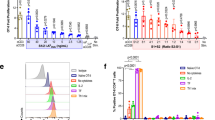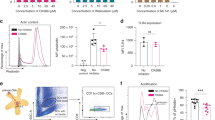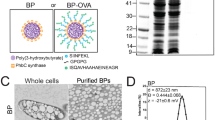Abstract
T cells secrete bioactive exosomes (EXO), but the potential immunoregulatory effect of T-cell EXO is largely unknown. In this study, we generated activated ovalbumin (OVA)-specific CD4+ T cells in vitro via coculture of OVA-pulsed dendritic cells (DCOVA) with naive CD4+ T cells derived from OVA-specific T-cell receptor (TCR) transgenic OTII mice. CD4+ T-cell EXO were then purified from the CD4+ T-cell culture supernatants by differential ultracentrifugation. CD4+ T-cell EXO exhibited the ‘saucer’ shape that is characteristic of EXO with a diameter between 50 and 100 nm, as assessed by electron microscopy, and contained the EXO-associated proteins LAMP-1, TCR and lymphocyte function associated antigen-1 (LFA-1), as determined by western blot. Flow cytometric analysis showed that CD4+ T-cell EXO expressed CD4+ T-cell markers (CD4, TCR, LFA-1, CD25 and Fas ligand), but to a lesser extent than CD4+ T cells. We demonstrated that DCOVA took up CD4+ T-cell EXO via peptide/major histocompatibility complex (pMHC) II/TCR and CD54/LFA-1 interactions. OVA-specific CD4+ T-cell EXO from OTII mice, but not ConA-stimulated polyclonal CD4+ T-cell EXO from wild-type C57BL/6 mice inhibited DCOVA-stimulated in vitro CD4+ T-cell proliferation and in vivo CD8+ cytotoxic T lymphocyte (CTL) responses and antitumor immunity against OVA-expressing B16 melanoma BL6-10OVA cells. In addition, EXO derived from a T-cell hybridoma cell line, MF72.2D9, expressing an OVA-specific CD4+ TCR, had a similar inhibitory effect as OTII CD4+ T-cell EXO on CTL-mediated antitumor immunity. Taken together, our data indicate that antigen-specific T-cell EXO may serve as a new type of immunosuppressive reagent for use in transplant rejection and treatment of autoimmune diseases.
This is a preview of subscription content, access via your institution
Access options
Subscribe to this journal
Receive 12 digital issues and online access to articles
$119.00 per year
only $9.92 per issue
Buy this article
- Purchase on Springer Link
- Instant access to full article PDF
Prices may be subject to local taxes which are calculated during checkout





Similar content being viewed by others
References
Thery C, Zitvogel L, Amigorena S . Exosomes: composition, biogenesis and function. Nat Rev Immunol 2002; 2: 569–579.
Thery C, Ostrowski M, Segura E . Membrane vesicles as conveyors of immune responses. Nat Rev Immunol 2009; 9: 581–593.
Zitvogel L, Regnault A, Lozier A, Wolfers J, Flament C, Tenza D et al. Eradication of established murine tumors using a novel cell-free vaccine: dendritic cell-derived exosomes. Nat Med 1998; 4: 594–600.
Hwang I, Shen X, Sprent J . Direct stimulation of naive T cells by membrane vesicles from antigen-presenting cells: distinct roles for CD54 and B7 molecules. Proc Natl Acad Sci USA 2003; 100: 6670–6675.
Andre F, Chaput N, Schartz NE, Flament C, Aubert N, Bernard J et al. Exosomes as potent cell-free peptide-based vaccine. I. Dendritic cell-derived exosomes transfer functional MHC class I/peptide complexes to dendritic cells. J Immunol 2004; 172: 2126–2136.
Hao S, Moyana T, Xiang J . Review: cancer immunotherapy by exosome-based vaccines. Cancer Biother Radiopharm 2007; 22: 692–703.
Chen W, Wang J, Shao C, Liu S, Yu Y, Wang Q et al. Efficient induction of antitumor T cell immunity by exosomes derived from heat-shocked lymphoma cells. Eur J Immunol 2006; 36: 1598–1607.
Blanchard N, Lankar D, Faure F, Regnault A, Dumont C, Raposo G et al. TCR activation of human T cells induces the production of exosomes bearing the TCR/CD3/zeta complex. J Immunol 2002; 168: 3235–3241.
Martinez-Lorenzo MJ, Anel A, Gamen S, Monle n I, Lasierra P, Larrad L et al. Activated human T cells release bioactive Fas ligand and APO2 ligand in microvesicles. J Immunol 1999; 163: 1274–1281.
Monleon I, Martinez-Lorenzo MJ, Monteagudo L, Lasierra P, Taules M, Iturralde M et al. Differential secretion of Fas ligand- or APO2 ligand/TNF-related apoptosis-inducing ligand-carrying microvesicles during activation-induced death of human T cells. J Immunol 2001; 167: 6736–6744.
Nolte-'t Hoen EN, Wagenaar-Hilbers JP, Peters PJ, Gadella BM, van Eden W, Wauben MH . Uptake of membrane molecules from T cells endows antigen-presenting cells with novel functional properties. Eur J Immunol 2004; 34: 3115–3125.
Umeshappa CS, Huang H, Xie Y, Wei Y, Mulligan SJ, Deng Y et al. CD4+ Th-APC with acquired peptide/MHC class I and II complexes stimulate type 1 helper CD4+ and central memory CD8+ T cell responses. J Immunol 2009; 182: 193–206.
Xie Y, Bai O, Yuan J, Chibbar R, Slattery K, Wei Y et al. Tumor apoptotic bodies inhibit CTL responses and antitumor immunity via membrane-bound transforming growth factor-beta1 inducing CD8+ T-cell anergy and CD4+ Tr1 cell responses. Cancer Res 2009; 69: 7756–7766.
Hao S, Bai O, Yuan J, Qureshi M, Xiang J . Dendritic cell-derived exosomes stimulate stronger CD8+ CTL responses and antitumor immunity than tumor cell-derived exosomes. Cell Mol Immunol 2006; 3: 205–211.
Thery C, Boussac M, Veron P, Ricciardi-Castagnoli P, Raposo G, Garin J et al. Proteomic analysis of dendritic cell-derived exosomes: a secreted subcellular compartment distinct from apoptotic vesicles. J Immunol 2001; 166: 7309–7318.
Bennett SR, Carbone FR, Karamalis F, Miller JF, Heath WR . Induction of a CD8+ cytotoxic T lymphocyte response by cross-priming requires cognate CD4+ T cell help. J Exp Med 1997; 186: 65–70.
Ridge JP, Di Rosa F, Matzinger P . A conditioned dendritic cell can be a temporal bridge between a CD4+ T-helper and a T-killer cell. Nature 1998; 393: 474–478.
Davis DM . Intercellular transfer of cell-surface proteins is common and can affect many stages of an immune response. Nat Rev Immunol 2007; 7: 238–243.
Williams ME, Densmore JJ, Pawluczkowycz AW, Beum PV, Kennedy AD, Lindorfer MA et al. Thrice-weekly low-dose rituximab decreases CD20 loss via shaving and promotes enhanced targeting in chronic lymphocytic leukemia. J Immunol 2006; 177: 7435–7443.
Huang JF, Yang Y, Sepulveda H, Shi W, Hwang I, Peterson PA et al. TCR-Mediated internalization of peptide-MHC complexes acquired by T cells. Science 1999; 286: 952–954.
He T, Zong S, Wu X, Wei Y, Xiang J . CD4+ T cell acquisition of the bystander pMHC I colocalizing in the same immunological synapse comprising pMHC II and costimulatory CD40, CD54, CD80, OX40L, and 41BBL. Biochem Biophys Res Commun 2007; 362: 822–828.
Hao S, Liu Y, Yuan J, Zhang X, He T, Wu X et al. Novel exosome-targeted CD4+ T cell vaccine counteracting CD4+25+ regulatory T cell-mediated immune suppression and stimulating efficient central memory CD8+ CTL responses. J Immunol 2007; 179: 2731–2740.
Wetzel SA, McKeithan TW, Parker DC . Peptide-specific intercellular transfer of MHC class II to CD4+ T cells directly from the immunological synapse upon cellular dissociation. J Immunol 2005; 174: 80–89.
Taams LS, van Eden W, Wauben MH . Antigen presentation by T cells versus professional antigen-presenting cells (APC): differential consequences for T cell activation and subsequent T cell–APC interactions. Eur J Immunol 1999; 29: 1543–1550.
Tsang JY, Chai JG, Lechler R . Antigen presentation by mouse CD4+ T cells involving acquired MHC class II:peptide complexes: another mechanism to limit clonal expansion? Blood 2003; 101: 2704–2710.
Helft J, Jacquet A, Joncker NT, Grandjean I, Dorothee G, Kissenpfennig A et al. Antigen-specific T–T interactions regulate CD4 T-cell expansion. Blood 2008; 112: 1249–1258.
Hao S, Yuan J, Xiang J . Nonspecific CD4+ T cells with uptake of antigen-specific dendritic cell-released exosomes stimulate antigen-specific CD8+ CTL responses and long-term T cell memory. J Leukoc Biol 2007; 82: 829–838.
He T, Tang C, Liu Y, Ye Z, Wu X, Wei Y et al. Bidirectional membrane molecule transfer between dendritic and T cells. Biochem Biophys Res Commun 2007; 359: 202–208.
Busch A, Quast T, Keller S, Kolanus W, Knolle P, Altevogt P et al. Transfer of T cell surface molecules to dendritic cells upon CD4+ T cell priming involves two distinct mechanisms. J Immunol 2008; 181: 3965–3973.
Daubeuf S, Lindorfer MA, Taylor RP, Joly E, Hudrisier D . The direction of plasma membrane exchange between lymphocytes and accessory cells by trogocytosis is influenced by the nature of the accessory cell. J Immunol 2010; 184: 1897–1908.
Ahmed KA, Munegowda MA, Xie Y, Xiang J . Intercellular trogocytosis plays an important role in modulation of immune responses. Cell Mol Immunol 2008; 5: 261–269.
Undale AH, van den Elsen PJ, Celis E . Antigen-independent acquisition of MHC class II molecules by human T lymphocytes. Int Immunol 2004; 16: 1523–1533.
Kedl RM, Schaefer BC, Kappler JW, Marrack P . T cells down-modulate peptide-MHC complexes on APCs in vivo. Nat Immunol 2002; 3: 27–32.
Andreola G, Rivoltini L, Castelli C, Huber V, Perego P, Deho P et al. Induction of lymphocyte apoptosis by tumor cell secretion of FasL-bearing microvesicles. J Exp Med 2002; 195: 1303–1316.
Taylor DD, Gercel-Taylor C, Lyons KS, Stanson J, Whiteside TL . T-cell apoptosis and suppression of T-cell receptor/CD3-zeta by Fas ligand-containing membrane vesicles shed from ovarian tumors. Clin Cancer Res 2003; 9: 5113–5119.
Abusamra AJ, Zhong Z, Zheng X, Li M, Ichim TE, Chin JL et al. Tumor exosomes expressing Fas ligand mediate CD8+ T-cell apoptosis. Blood Cells Mol Dis 2005; 35: 169–173.
Loser K, Vogl T, Voskort M, Lueken A, Kupas V, Nacken W et al. The Toll-like receptor 4 ligands Mrp8 and Mrp14 are crucial in the development of autoreactive CD8+ T cells. Nat Med 2010; 16: 713–717.
Russell JH, Ley TJ . Lymphocyte-mediated cytotoxicity. Annu Rev Immunol 2002; 20: 323–370.
Acknowledgements
This study was supported by research grants from the Canadian Institutes of Health Research (MOP 79415 and 89713).
Author information
Authors and Affiliations
Corresponding author
Rights and permissions
About this article
Cite this article
Zhang, H., Xie, Y., Li, W. et al. CD4+ T cell-released exosomes inhibit CD8+ cytotoxic T-lymphocyte responses and antitumor immunity. Cell Mol Immunol 8, 23–30 (2011). https://doi.org/10.1038/cmi.2010.59
Received:
Revised:
Accepted:
Published:
Issue Date:
DOI: https://doi.org/10.1038/cmi.2010.59
Keywords
This article is cited by
-
Bioengineered exosomal-membrane-camouflaged abiotic nanocarriers: neurodegenerative diseases, tissue engineering and regenerative medicine
Military Medical Research (2023)
-
Native and engineered exosomes for inflammatory disease
Nano Research (2023)
-
The roles of small extracellular vesicles in cancer and immune regulation and translational potential in cancer therapy
Journal of Experimental & Clinical Cancer Research (2022)
-
Exosome application in tumorigenesis: diagnosis and treatment of melanoma
Medical Oncology (2022)
-
Integrated view of molecular diagnosis and prognosis of dengue viral infection: future prospect of exosomes biomarkers
Molecular and Cellular Biochemistry (2022)



